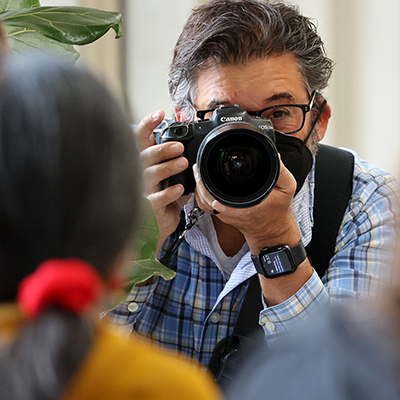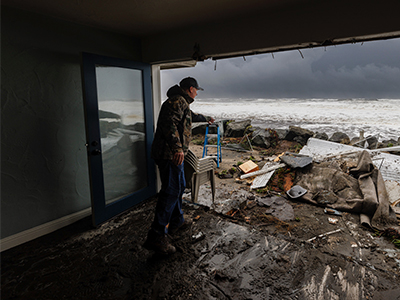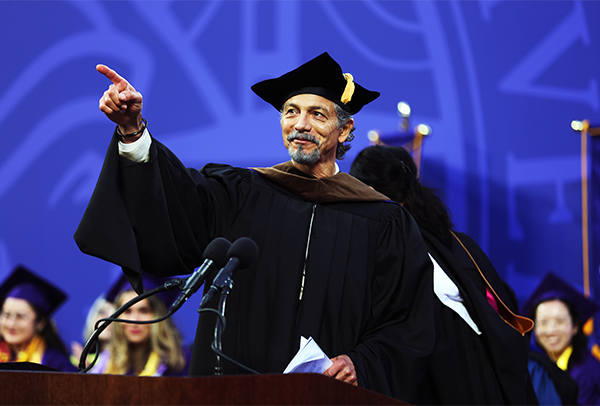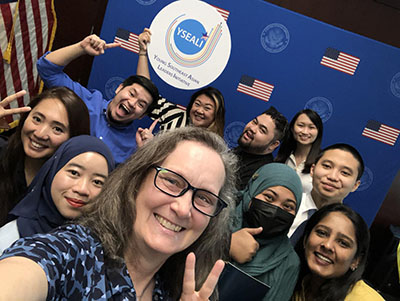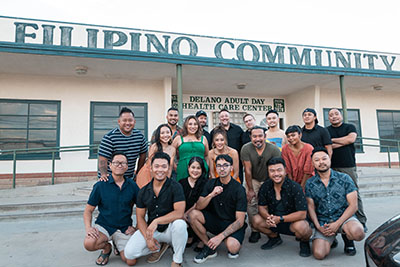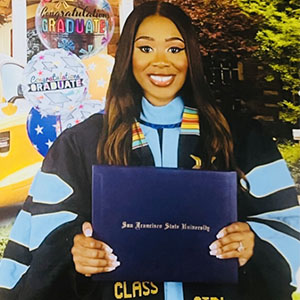ABC news anchor and alumnus Whit Johnson returns to SFSU to inspire students
Johnson visited campus to share insights from his “strategic and surprising” career with Journalism and Broadcast and Electronic Communication Arts students
Emmy-winning journalist Whit Johnson (B.A., ’04) has experienced a lot in the 20 years since he was a Broadcast and Electronic Communication Arts (BECA) major at San Francisco State University. He was among the first reporters to interview Secretary of State Hillary Clinton after Libyan dictator Muammar Gaddafi was killed. He reported on the recent total solar eclipse and covered two Olympics. And he just got back from Florida, where he covered Hurricane Helene.
When you’ve had experiences like that, you build up a lot of stories — and Johnson returned to the San Francisco State campus Tuesday, Oct. 1, to share some. The co-anchor of the “Good Morning America” weekend editions and anchor of the Saturday edition of ABC’s “World News Tonight,” Johnson talked to students about journalism, his journey and his advice for launching a successful career. The event, held in SFSU’s Knuth Hall, was moderated by Journalism Professor Venise Wagner, who brought along students from her class “Social Impact of Journalism.”
“I never imagined that I would end up here [as a network anchor],” Johnson said. “But the one thing that I think I did have going for me was just a work ethic that I developed while I was here at San Francisco State.”
Johnson grew up in San Francisco, and both his parents are SF State alums. (Johnson’s dad actually joined him for his Oct. 1 visit, and they were both chuffed to talk about how the school evolved from the ’60s to the early 2000s to now.) Johnson came to the University for the broadcasting department — and soccer. He wanted to be a professional player, but injuries halted that journey.
“While I was here, I sort of evolved from a wannabe morning disc jockey and prank caller to a sports broadcaster to a news broadcaster,” Johnson said. Since the news initially seemed intimidating, he leaned into sports broadcasting. He even voiced Gator basketball, welcoming spectators and doing PA announcements.
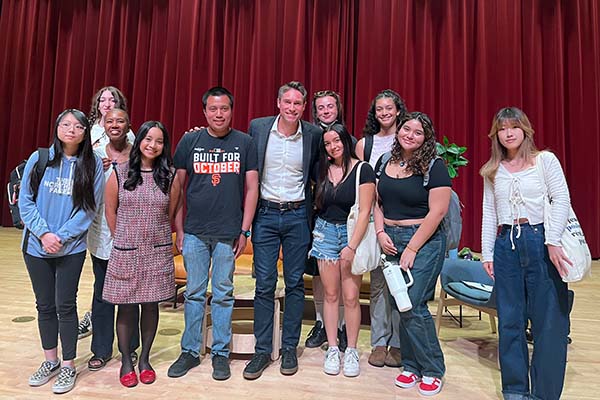
Johnson with some of the students who attended the panel. Photo by Nicole Lange.
As he approached graduation, he began putting together VHS resumes, using the campus editing bay to work on the tapes. “Out of dozens of tapes, I got exactly three job offers. None of them were in sports,” he recounted.
He accepted a broadcasting job in Yakima, Washington, for a salary of $18,000. Though it felt less than ideal, the move set the trajectory of his professional and personal career. He met his wife, journalist Andrea Fujii, in Yakima. When she got a job in Salt Lake City, he followed. He got a job at CBS News in Washington, D.C., while she got a job in Baltimore. To prioritize his family, he returned to local news with KNBC in Los Angeles, before ultimately ending up at ABC News in New York, while his wife became a freelancer for ABC News.
“Every career move along the way has been both strategic and surprising,” he told students. But the chain of events all started because he was prepared for that first post-grad step.
“The facilities here allowed me to fine tune the skills that I needed to get my first jobs, get my foot in the door … ,” he explained, emphasizing the importance of being able to pitch himself as a reporter who could shoot, write and edit his own material on a tight deadline. “[As a student] I was hanging out in the news studio, in the sports studio. I was doing reports when I wasn’t supposed to be doing reports. I was hanging out in the control room when I wasn’t supposed to be in the control room. I was using the edit bays just on my own.”

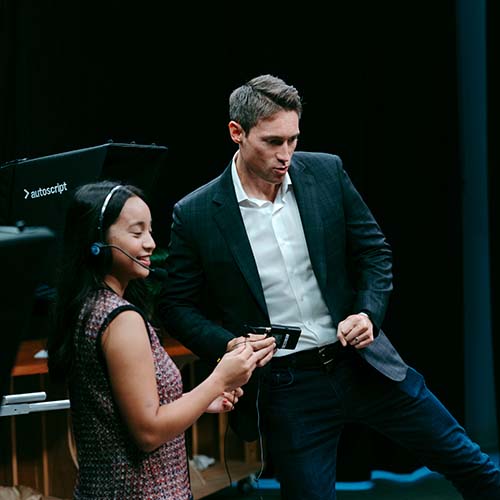
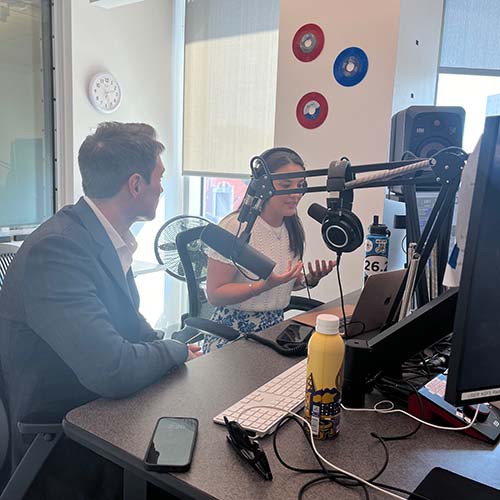
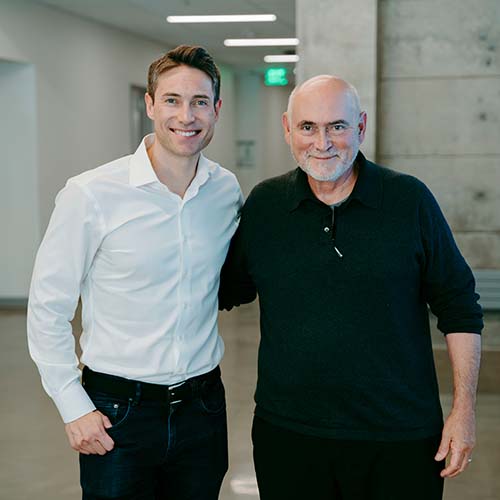
Left to right: Johnson doing live to tape and radio interviews with students, and posing with his father in Marcus Hall.
Johnson maximized his time with his professors, too. He fondly recalls talking to professors like Professor Emeritus of Broadcast and Electronic Communication Arts Marty Gonzalez, KRON-TV’s weekend morning anchor today, peppering them with questions about getting into journalism, salaries and more. “I asked all the awkward, uncomfortable questions,” Johnson recalled. “Through those experiences, through access and talking to people, I learned that you’ve got to be willing to pack up and go where you need to go.”
Some of his most memorable SF State experiences were listening to speakers who came to talk about their own careers. They were often people he grew up watching on TV. Now current SF State students get to say the same about Johnson. In addition to the talk in Knuth Hall, he also dropped by Marcus Hall to be interviewed by BECA students for live to tape and radio interviews.
“He had a lot of information that was needed for all of us. I like to hear about his stories of where he went and what happened,” said first-year Creative Writing major Savannah Paquette, who attended Johnson’s morning panel.
“In order for this job and career, you need to just get up and go to random places, to record and give the information to the world,” she said of what she learned from Johnson.
Learn more about SFSU’s Department of Broadcast and Electronic Communications Arts and Department of Journalism.
